God's dew. How a former RT employee promotes Russians at War in the West
The scandal surrounding the Russians at War documentary has once again reminded Ukrainians of having to defend not only Ukraine from the Russian army but also the world from Russian propaganda.
Otherwise, it is difficult to explain how the state-owned Canadian Media Fund allocated $340,000 at the expense of Canadian taxpayers to shoot Anastasia Trofimova’s Russians at War. To contextualize, she has already created 11 documentaries for the state-owned Russian company RT documentary.
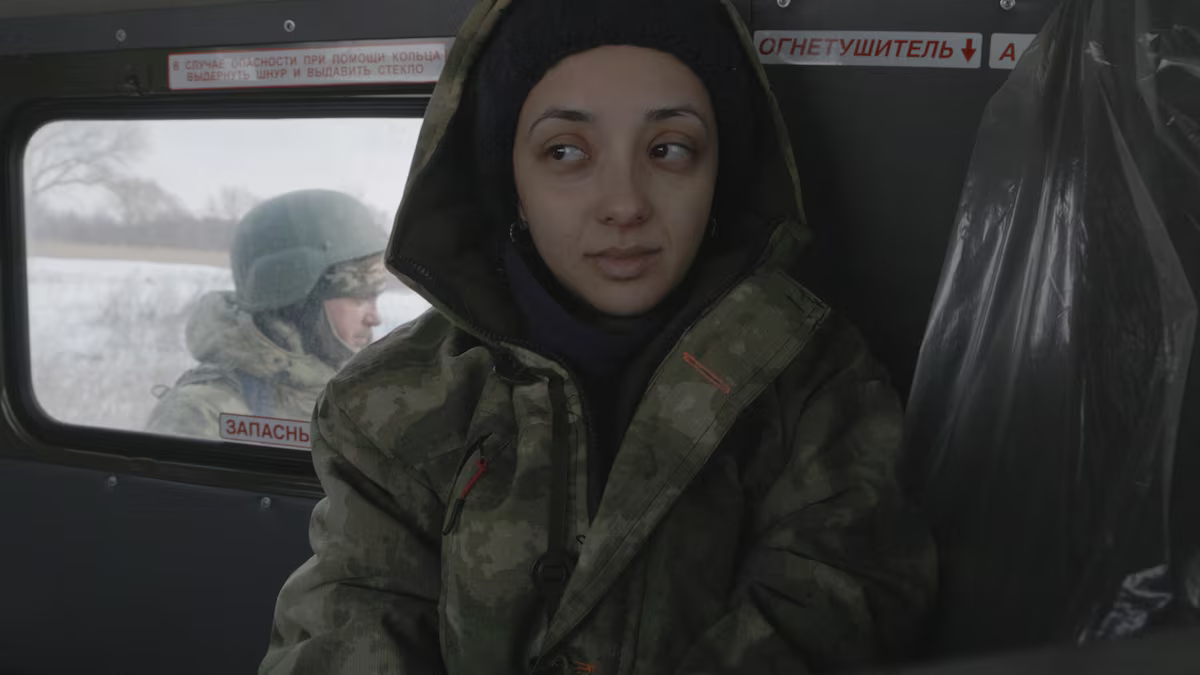
On September 6, the Venice Film Festival screened her 11th film, Russians at War, telling the story of the Russian-Ukrainian war through the prism of Russian propaganda and showing it through the eyes of Russian soldiers fighting in Ukraine.
Update on September 11, 2024
The Canadian media education group TVO pulled the film from the air, refused to support it, and promised to investigate how it was financed.
Yesterday, on September 10, the organization's website published a comment by TVO's chairman of the board of directors, Chris Day.
“We have listened to the Ukrainian Canadian community and its thoughtful and sincere input. TVO's Board of Directors has decided to respect the feedback received, and TVO will no longer support or broadcast the film Russians at War. TVO will review the process by which this project was funded and our brand was used,” he said.
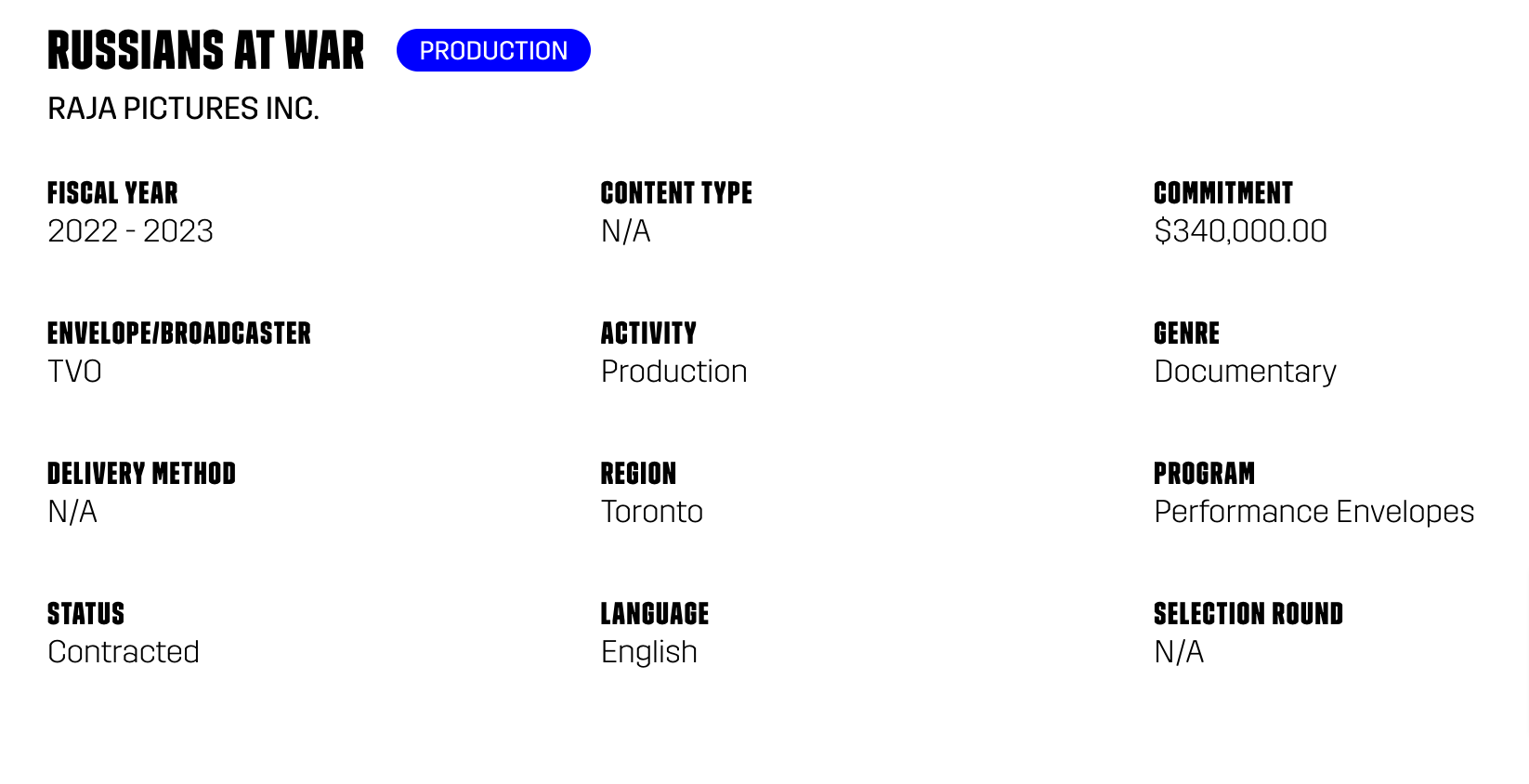
On September 10, it is being screened in Canada at the Toronto International Film Festival (TIFF). Neither the organizers of this festival nor the media group behind its production seem to acknowledge the protests, statements, or warnings from Ukrainians, despite Canada providing significant state-level support to Ukraine in the Russian-Ukrainian war.
Darya Bassel, a Ukrainian producer and programmer at the Docudays UA International Documentary Film Festival, saw the movie and was the first to write about it, calling it a vivid example of pure Russian propaganda.
I watched a film today at the Venice Film Festival titled "Russians at War." Since our film is in the same section as this one, I usually wouldn’t speak publicly about it. However, in this case, I cannot remain silent, because it’s not just about films and art, but about the lives of thousands of people who die in this war— a war that has instrumentalized propaganda as its weapon.
This film may mislead you into believing that it is an anti-war film, one that questions the current regime in Russia. However, what I witnessed is a prime example of pure Russian propaganda. Here’s why.
The filmmaker begins by expressing her surprise at the Russian invasion of Ukraine in 2022. In her film, she always uses the term “invasion” and never "full-scale invasion." She does not mention that Russia invaded Ukraine and annexed Crimea in 2014. These two events seem to not exist in the world of this film. The filmmaker also states that her country hasn’t participated in wars for many years and that she has only read about wars in books. Thus, the war in 2022 was a complete shock for her. It’s interesting how the filmmaker could overlook the fact that her country has been inherently involved in various wars and occupations for at least the last 30 years (1992-93 Transnistria, Abkhazian War, 1994-96 and 1999-2009 Chechen Wars, the 2008 war in Georgia, and the 2015-2022 invasion of Syria).
The filmmaker starts her narrative with a Ukrainian who now lives in Russia and fights on the Russian side. This is a very intriguing choice for the beginning of a story about Russians at war. Later, this character will claim that a CIVIL war began in Ukraine in 2014. He will also suggest that Ukrainians bombed the eastern parts of their own country (and this is why he moved to Russia). Another character will declare that Ukrainians are Nazis. We’ve heard these narratives before; they are (and apparently still are) widely and actively propagated by Russian media. One of those horns of propaganda is Russia Today channel, for which the director of "Russians at War" has previously made several documentary films.
Throughout the film, all characters express their confusion about their actions in Ukraine, stating they want the war to end and that most of them are fighting for money. In the final part of the film, the battalion is moved to Bakhmut, and most characters die in battle. We then see their comrades and relatives grieving at their graves. All of them repeat that they don’t understand why this war is happening and who needs it. In the end, the filmmaker concludes that these are poor, ordinary Russian people who are being manipulated into war by larger political games. I found this perspective amusing because the filmmaker—like putin and his regime—plays an interesting game with these people. They deny them the simple ability to possess dignity and to think and decide for themselves. To her, these people are merely powerless objects. If those engaged in a war that has lasted over 10 years were not powerless, it would imply that they, in the majority, actually support this war, wouldn’t it?
You will feel pity for the people depicted as dying in the film and for those we see crying for their loved ones. And you should—if you are a normal human being, you should feel pity, sadness, and emotion. However, it is also important to remember that these individuals joined the army that invaded an independent country, many of them willingly, as we learn from the film. You should also recall Bucha, Irpin, Mariupol, and the civilians who were murdered there. Remember the thousands of children who were illegally transported from Ukraine to Russia. While I’m writing this and while you’re reading it, missiles are striking Ukrainian cities. The buttons are pushed by ordinary Russians. Are their crimes any less significant simply because they claim to be unaware of why they are involved in this war?
By the way, the director asks one of the characters if he thinks the Russian army commits any war crimes. He answers “no,” claiming he hasn’t witnessed any war crimes. Interestingly, the director echoes this in her interviews, stating she saw no signs of war crimes during her time near the front (https://www.reuters.com/.../russian-soldiers-given-their.../). We can only be happy for her that she was fortunate enough not to witness any war crimes. Unfortunately, thousands of Ukrainians have not been so lucky.
I could continue, but I believe it’s enough to understand that this film presents a very distorted picture of reality, spreading false narratives (calling the Russian invasion and annexation of Crimea a civil war; suggesting that the Russian army does not commit any war crimes; presenting those who are part of the aggressors army as victims).
If you decide to watch it, I recommend following it with another documentary about Russian soldiers titled "Intercepted," directed by Oksana Karpovych. "Intercepted" also opens a door into the lives of ordinary Russians fighting in this war. You’ll be curious to explore it, as it will undoubtedly surprise you. You may also want to add "20 Days in Mariupol" to your viewing list, just to be able «to see through the fog of war," as the director of "Russians at War" so aptly put it.
However, neither Darya's post, nor the wave of discussions on social media, nor the appeal of the Ukrainian Canadian Congress and Oleh Nikolenko, the Consul General of Ukraine in Toronto, have had the desired effect. As of Monday morning, September 9, the North American premiere has not been canceled.
The TVO media group, which co-financed the production of the film at taxpayer expense (the French government was also involved), said that the film is “at its core an anti-war film. It is unauthorized by Russian officials and was made at great personal risk to the filmmaker” and “in the tradition of independent war correspondence.”
The press release concludes with a call to watch the film on TVO in future theaters and assurances that the media group provides “high-quality” and “ethical” content.
In a release on the festival's website, the organizers of the Toronto International Film Festival omit the fact that Trofimova has a longstanding relationship with RT Documentary, a division of Russia Today, a Russian government-funded state media company serving as the main source of Russian propaganda in the world.
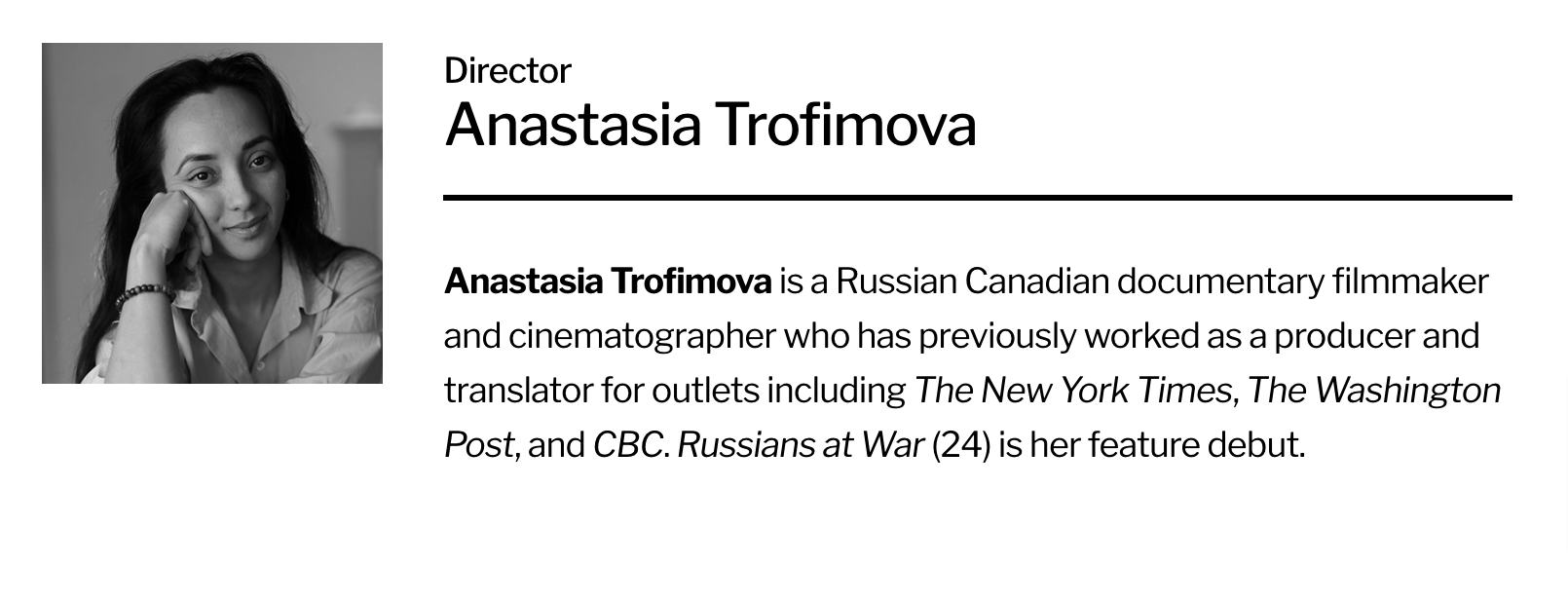
Instead, the release repeats the Russian narrative about “Ukrainian Nazism” without footnotes or warnings, ending with a “touching” conclusion about the “sacrifice” of the Russian military and the fact that they are forced to continue fighting to survive.
This is how the movie is announced:
“Trofimova, without permission, joins Ilya and his supply unit as they embark on a grueling journey to the front line.”
As Russia’s unjust war on Ukraine rages on, it is critical to understand the long history of colonization that has led to this current moment. Russian Canadian filmmaker Anastasia Trofimova’s gripping first-person documentary takes us beyond the headlines to join Russian soldiers as they place themselves in a battle for reasons that become only more obscure with each gruelling day, each confusing command, each gut-wrenching casualty.
Russians at War was born of a chance encounter between Trofimova and a middle-aged man on a train. That man, a Ukrainian named Ilya, was about to leave his family and go to war — for Russia. Intrigued by his story, Trofimova, though lacking permission, joins Ilya and his supply unit as they make their harrowing journey to the front line. Many soldiers fighting alongside Ilya are very young. Some believe they’re going to vanquish Ukrainian Naziism. Others go out of belief in cultural unity between Russia and Ukraine. Eventually, they all come to realize that everything they heard about the war in Russian media is false. They begin to doubt their purpose — and fight only to survive.
Moscow-born and Toronto-educated, Trofimova has been chronicling conflicts in Iraq, Syria, and the Democratic Republic of the Congo. Working closely with veteran editor Roland Schlimme (a longtime collaborator of Peter Mettler and Jennifer Baichwal), Trofimova assembles a spellbinding tale of sacrifice and disillusionment in which soldiers resemble pawns in a nefarious game. Russians at War reminds us of the human cost on both sides. As Trofimova so eloquently puts it, “the fog of war is so thick that you can’t see the human stories it’s made of.”
On Saturday, September 7, after the scandal, the online IMDb catalog, where the film is presented, changed the location of the shooting, replacing Russia with Ukraine (because the film took place in the occupied territories of Ukraine). The plot description was limited to a laconic one: “Russian Canadian filmmaker Anastasia Trofimova’s gripping first-person documentary takes us beyond the headlines to join Russian soldiers in Ukraine.”
The director says she wanted to show Russian soldiers as mere people, not just war criminals, as everyone in the West believes. Moreover, she did not see any war crimes committed by them.
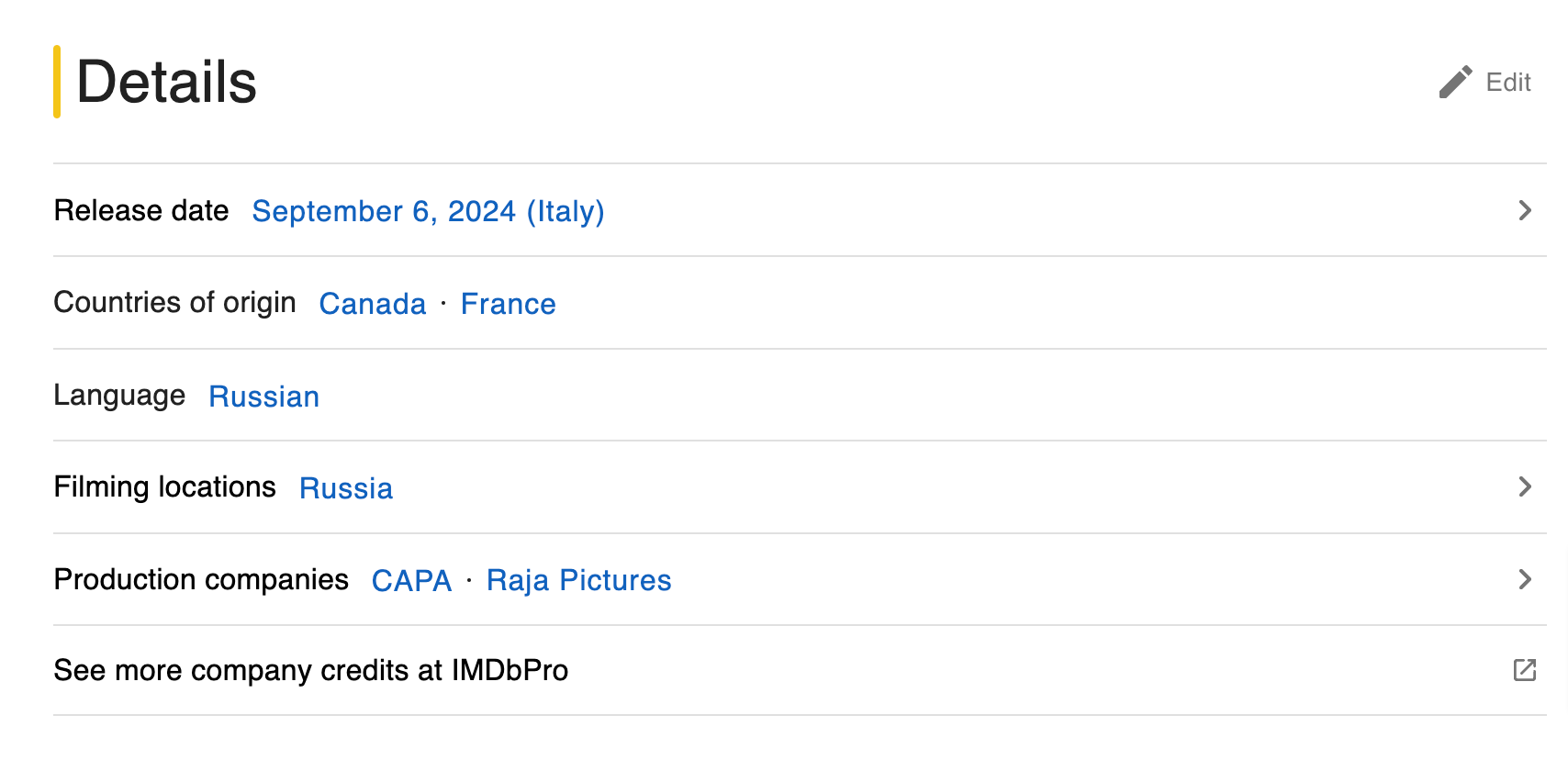
Based on this reaction, it appears that neither Canadian producers, the organizers of the Venice and Toronto festivals, nor the IMDb administrators grasp what the issue is and why Ukrainians are discontent again.
Neither Canadian producers nor organizers of film festivals in Venice and Toronto understand what is wrong with them.
For this reason, we will try to explain in detail once again.
1. Trofimova's work with Russia Today Documentary
Russia Today Documentary (RTD) is one of the many divisions of Russia Today, an international multilingual news network founded and funded by the Russian government and the world’s key multilingual source of Russian propaganda.
After the full-scale invasion of Ukraine in 2022, the network is under sanctions in the United States and Canada. RT's broadcasting has been suspended in the EU. Apple has removed the RT app from all countries except Russia. So has Microsoft. Despite bans and sanctions, RT's content continues to be distributed globally. The RT Documentary division (in English and Russian) was founded in 2011 and inaugurated by then-Russian President Dmitrii Medvedev during a visit to RT's studio in Moscow.
In March 2022, the RT Documentary channel was blocked on YouTube. In early September, US intelligence agencies announced an investigation into attempts to interfere in the US elections by a network of American bloggers created with the participation of RT (Texty.org.ua wrote about the prominent role of the RT network in spreading Russian disinformation in the United States in June).
Prolonged interaction with any RT division and the Russian army (which is exactly the experience Anastasiia Trofimova has, judging by the topics of her filmography) should be a red flag for any Western institution and a reason for a detailed check of the candidate's background for receiving public funds, grants, participation in film festivals, etc.
The world is carefree in its admiration for the fact that “Russian Canadian filmmaker Anastasia Trofimova has gripped the first-person documentary to join Russian soldiers in Ukraine”
But for some reason, it does not work that way. The world is carefree in its admiration for the fact that “Russian Canadian filmmaker Anastasia Trofimova has gripped the first-person documentary to join Russian soldiers in Ukraine.”
2. “The first-person access to the Russian army”
No one in Russia will allow independent journalists to enter military units. And even if they did, negative coverage of this war in Russia is subject to criminal liability, and it is hard to expect an employee of a propaganda channel to go to jail for a truthful military report.
So we are looking at another deceptive trick designed to mislead naive Western media producers and officials
However, the story behind the film's creation, as presented by the organizers of the Canadian Film Festival, is remarkably simple. Trofimova — being in Moscow at the time of the invasion as her social media accounts show — allegedly met a Ukrainian named Ilya on a train by chance. He decided to fight for Russia and then, “without permission,” she went with him to the front line, having spent seven months with his unit (judging by the context, somewhere near Bakhmut, in the Donetsk region occupied by the Russian army).
Just like that — can you imagine?
No FSB interrogations, no checks, no accreditation, no obstacles from the Russian authorities. It was enough just not to ask for permission! Meanwhile, residents of the Russian-occupied territories often describe the atmosphere of constant fear and terror, where disappearances are frequent, and cell phones are routinely inspected to see if they are reading Ukrainian media or Telegram channels.
Residents are thrown into torture chambers, for example, even for “catching their [Russian] eye too often.”
But for some reason, no questions were raised at numerous Russian checkpoints about a Western-educated filmmaker — the festival organizers emphasize that she has a Canadian education — who lived in a combat unit for seven months and made some uncoordinated film.
So, we are sure that such a film about the war could not have been made without the knowledge of the Russian authorities. It is extremely naïve to assume that this was done at the filmmaker's own risk and without the approval of at least the unit's command, the local occupation administration, and the FSB.
And given the level of centralization of power and decision-making in Russia, it is unlikely that this permission was issued at the local level.
Trofimova is a close acquaintance of Prigozhin's associate
By the way, on Trofimova's personal Facebook page, if you scroll a little deeper, you can see an obituary she wrote on the death of Russian military correspondent Kirill Romanovsky, whom the Russian media call a friend and associate of the late Yevgeny Prigozhin, leader of the Wagner private military group fought in Ukraine, Syria, and Africa.
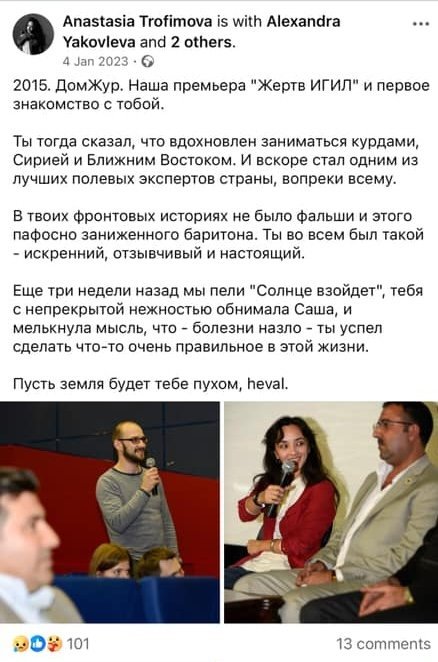
Russian media call Romanovsky a friend and associate of the late Yevgeny Prigozhin, the leader of the private military group Wagner, which fought in Ukraine, Syria, and Africa. He was a Russian propagandist and Prigozhin's personal “chronicler,” accompanying the unit for eight years and writing a book about it.
Trofimova responded to the accusations of Ukrainian filmmakers of trying to humanize the invaders by saying that “we must humanize everyone. This is a huge tragedy for our region in the first place.” She added that “these black and white stereotypes about each other will only contribute to the continuation of the war. It will only lead to hatred growing... Unfortunately, this is the way politicians are going, but I don't think this is the way ordinary people should go.”
3. Russia is the aggressor, Ukraine is the victim. Not vice versa
Despite Trofimova's attempts to blur the focus and separate the state from some “politicians,” it should be clearly remembered that the unprovoked war of aggression waged by Russia against Ukraine is not just “the path of politicians.” The state of Russia is the aggressor, involving hundreds of thousands of citizens in the attack and destroying the population of an independent neighboring state.
The difference in the status of Ukraine and Russia in this war seems to have been forgotten by the director of the Venice Film Festival, Alberto Barbera.
In a commentary to the French AFP agency, he defended the film by the Russian director, expressing hope that “films about the war shown at the festival will not become ‘hostages to ideological prejudices and polemical statements that are useless. Among the most relevant are two documentaries about the war in Ukraine, which are viewed from radically opposite points of view.’”
4. “Ukraine has been shelling Donbas for 8 years” (no)
The filmmaker says that a resident of the occupied Donetsk region is fighting on the side of Russia because “Ukraine has been shelling Donbas for 8 years” when the civil war began but does not explain that Ukraine did not shell Donbas (read the deconstruction of this myth here). Moreover, the war having begun in 2014 was not a civil war, it was an undeclared invasion by the Russian army.
Read more about Russian narratives in the context of the Russian-Ukrainian war that are still circulating in the West here.
5. Non-existing “Ukrainian Nazism”
Another thesis stated by a film character but not deconstructed by the allegedly independent director is “Nazism in Ukraine.” It is a Russian propaganda construct used by the Russian authorities to justify the invasion. However, in reality, neither Nazism nor neo-Nazism is tolerated in Ukraine. Unlike Russia, Ukraine is a democratic country.
Year after year, Ukraine has been one of the most tolerant countries in Europe toward Jews. There is not a single far-right force in the Ukrainian parliament. We recall a well-known fact: Volodymyr Zelenskyi, who won 73% of the vote in the presidential election, is a Jew. All far-right parties in the last parliamentary elections received only about 2% of the vote and did not enter parliament.
Ukraine’s accusations of Nazism are not supported by researchers, journalists, and academics.

